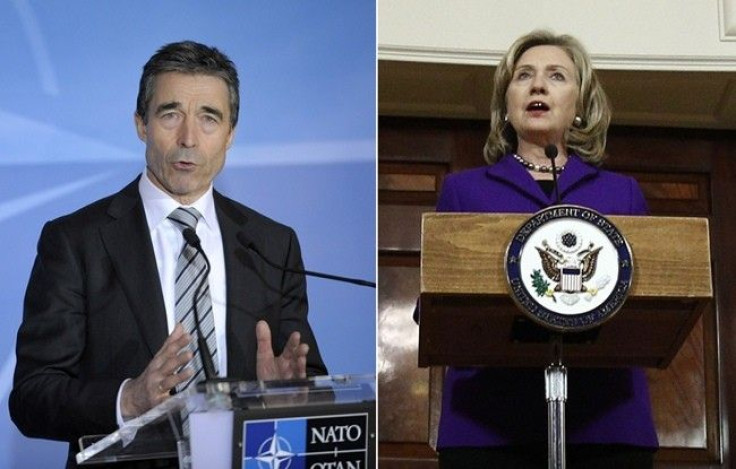NATO Taking Libya Mission from U.S., Details in Discussion

U.S. Military officials are working on details on the transfer of command and control power for enforcing a no-fly zone over Libya.
U.S. Secretary Hillary Clinton said on Thursday that NATO would assume control in the days ahead, in an announcement after all 28 allies agreed to take charge of enforcing U.N. resolution 1973, which calls for military force to be used to protect civilians, including a no-fly zone.
All NATO Allies are committed to fulfill their obligations under the UN resolution. That is why we have decided to assume responsibility for the no-fly zone, said NATO Secretary General Anders Fogh Rasmussen on Thursday.
U.S. Vice Adm. Bill Gortney, Director of the Joint Staff, said on Thursday, ahead of the announcement that he was in very close consultation with Adm. James Stravidis, the top NATO military commander.
All of the leadership is involved on working out those particular details, and I'm not at liberty to discuss any of those details just yet, he said.
Gortney made on Thursday, ahead of an announcement from NATO, and later U.S. Secretary of State Hillary Clinton, that NATO was taking over in the next few days.
NATO had already been taking over details about how to enforce a U.N. Resolution which calls for an arms embargo on weapons to Libya.
NATO said Wednesday that it was activating NATO ships and aircraft in the Central Mediterranean to enforce the embargo.
On Wednesday, NATO spokesperson Oana Lungescu said that a plan to enforce the no-fly zone had been approved but execution of the plan was awaited as all 28 allies discussed it. That step was taken Thursday.
So far, the nations with most military involvement in the operations have been Britain, France and the United States.
Arab Contributions
Qatar had, until now, been the only arab nation providing its jets for enforcement of the no-fly zone. Clinton said the United Arab Emirates would also begin participating.
The way for NATO to take over was paved in part by Turkey, a member of the group.
All of Turkey's concerns, demands on the issue have been met, said Ahmet Davutoglu, Turkey's foreign minister, according to Turkish state media. He said the transfer in command will occur in a day or two.
The coalition of nations formed in talks in Paris recently will abandon the mission and hand it over entirely to a single command system under NATO, he said.
Turkey had previously expressed reservations about NATO taking over and wanted assurances that the operation would be limited to the protection of civilians, the enforcement of an arms embargo and a no-fly zone, and the offer of humanitarian aid.
He said a compromised was reached in a conference call with counterparts with the U.S., France and Britain.
Earlier in the week, the Arab League, a voluntary group of 22 North African and Middle Eastern countries, reiterated its support for a United Nations resolution authorizing the use of military force to protect civilians.
It had expressed concern that the bombings had killed civilians. The Libyan government had reported deaths in statements which the U.S. had dismissed as lies.
The Arab League's support for a no-fly zone over Libya was an important factor in the decision by members of the UN Security Council voting for action in Libya.
© Copyright IBTimes 2024. All rights reserved.











